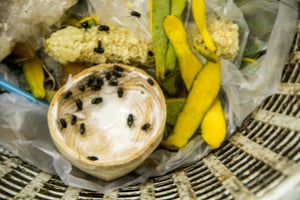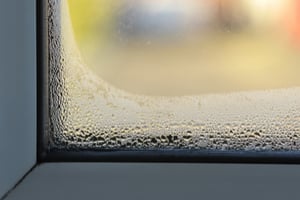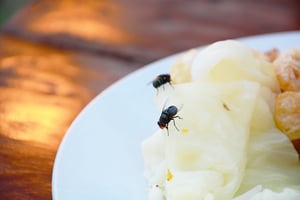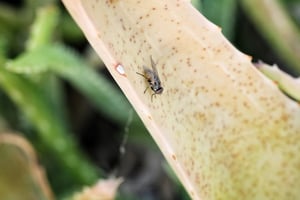Eliminate breeding sites
 Most of the flies that get into your home in the summer have very short lifespans. House flies, for instance, generally only live between 10 and 25 days. During summer, that life cycle may be even faster. Unfortunately, that means flies also reproduce and grow very quickly. Flies can grow from egg to larvae to adulthood in a matter of days. Often, that growth all happens inside your home!
House and fruit flies tend to “plant” their eggs inside soluble foodstuff. When the eggs hatch, the larvae feed on this foodstuff until they’re grown. Making nesting sites unavailable to flies is the most important way to prevent long-term fly infestations in your home. Flies will lay eggs in any source of standing water or soluble food source. Make sure all these sources are sealed up and as inaccessible as possible. Pay special attention to your garbage and recycling bins, which are often a hotspot for fly breeding.
Most of the flies that get into your home in the summer have very short lifespans. House flies, for instance, generally only live between 10 and 25 days. During summer, that life cycle may be even faster. Unfortunately, that means flies also reproduce and grow very quickly. Flies can grow from egg to larvae to adulthood in a matter of days. Often, that growth all happens inside your home!
House and fruit flies tend to “plant” their eggs inside soluble foodstuff. When the eggs hatch, the larvae feed on this foodstuff until they’re grown. Making nesting sites unavailable to flies is the most important way to prevent long-term fly infestations in your home. Flies will lay eggs in any source of standing water or soluble food source. Make sure all these sources are sealed up and as inaccessible as possible. Pay special attention to your garbage and recycling bins, which are often a hotspot for fly breeding.
Control moisture
 Every kind of fly needs to stay hydrated to survive. The ones in your home need moist surfaces for virtually everything they do. Mosquitoes and fruit flies can only lay their eggs on moist surfaces. House flies can only “eat” liquid of soluble foods, so they need moisture to eat, too. Humidity even makes it easier for the flying pests to stay active longer and reproduce more frequently. The more moisture they have access to, the more they’ll bother you.
Look for any sources of uncontrolled moisture, starting in the rooms where flies tend to congregate. Flies only need the slightest amount of moisture to stay hydrated. Even condensation on walls or windows might be enough to sate them. Look for plumbing leaks, dripping faucets, rotting fruits and vegetables, and leftover drinks. Make sure you rinse out cans and bottles before you recycle them. Seal your garbage in airtight bags and take it outside as frequently as possible. Consider using a dehumidifier if indoor humidity continues to be a serious problem.
Every kind of fly needs to stay hydrated to survive. The ones in your home need moist surfaces for virtually everything they do. Mosquitoes and fruit flies can only lay their eggs on moist surfaces. House flies can only “eat” liquid of soluble foods, so they need moisture to eat, too. Humidity even makes it easier for the flying pests to stay active longer and reproduce more frequently. The more moisture they have access to, the more they’ll bother you.
Look for any sources of uncontrolled moisture, starting in the rooms where flies tend to congregate. Flies only need the slightest amount of moisture to stay hydrated. Even condensation on walls or windows might be enough to sate them. Look for plumbing leaks, dripping faucets, rotting fruits and vegetables, and leftover drinks. Make sure you rinse out cans and bottles before you recycle them. Seal your garbage in airtight bags and take it outside as frequently as possible. Consider using a dehumidifier if indoor humidity continues to be a serious problem.
Restrict food access
 The three most common flies that get into homes are house flies, blow flies, and fruit flies. All three of these flies are attracted to rotting, fermenting food materials. Flies tend to be especially interested in sweet, sticky substances like soda, sugar, or syrup. You’ve probably noticed blowflies and house flies around your garbage especially. As food begins to decay or rot, it becomes both more attractive and easier to eat for flies. Untended garbage cans tend to be fly paradise.
Although flies can’t technically “eat” solid foods, they can liquefy lots of food quite efficiently. Flies are most attracted to overripe produce, old meat, spoiled milk, fermenting liquids, and other pungent foods. Take care to remove food from your home before it spoils. Dispose of garbage regularly and pay attention to expiration dates. Flies can also eat most grain products. Store pantry items like pasta and cereal in airtight, sealed plastic containers. Clean up crumbs, spills, and other messes as soon as they happen.
The three most common flies that get into homes are house flies, blow flies, and fruit flies. All three of these flies are attracted to rotting, fermenting food materials. Flies tend to be especially interested in sweet, sticky substances like soda, sugar, or syrup. You’ve probably noticed blowflies and house flies around your garbage especially. As food begins to decay or rot, it becomes both more attractive and easier to eat for flies. Untended garbage cans tend to be fly paradise.
Although flies can’t technically “eat” solid foods, they can liquefy lots of food quite efficiently. Flies are most attracted to overripe produce, old meat, spoiled milk, fermenting liquids, and other pungent foods. Take care to remove food from your home before it spoils. Dispose of garbage regularly and pay attention to expiration dates. Flies can also eat most grain products. Store pantry items like pasta and cereal in airtight, sealed plastic containers. Clean up crumbs, spills, and other messes as soon as they happen.
Clean Up Outside
 Of all the fly preventing procedures we recommend, this one may be the most overlooked. The same things that attract flies to the inside of your home attract them outside it, too. If something outside your home attracts flies, you’ll see more of them around. The flies that come to the outside of your home may decide they want in, too. Moisture, food sources, rot or fermentation, and humidity attract them outside just as much as they do inside.
Often, flies are attracted to manure piles as a source of humidity, food, and water. They can also reproduce quite effectively in rotting mulch, dying plants, or untended compost piles. Look for places where moisture accumulates outside, too. Low spots, ditches, gutters, buckets, or even pavement cracks can all provide enough water for flies to thrive in. Various outdoor plumbing fixtures may also leak and attract them. Check faucets, hoses, and sprinklers to make sure they’re not producing standing water.
Flies are everywhere this summer, but that doesn’t mean you should have to suffer having them in your home. These basic sanitation and exclusion tips will go a long way toward keeping the buzzing pests from infesting your home.
If you feel like you’ve tried everything and you still have a fly problem, however, don’t hesitate to give Plunkett’s a call. Our fly treatments will keep the flying pests from bothering you, so you can enjoy your summer in peace.
Of all the fly preventing procedures we recommend, this one may be the most overlooked. The same things that attract flies to the inside of your home attract them outside it, too. If something outside your home attracts flies, you’ll see more of them around. The flies that come to the outside of your home may decide they want in, too. Moisture, food sources, rot or fermentation, and humidity attract them outside just as much as they do inside.
Often, flies are attracted to manure piles as a source of humidity, food, and water. They can also reproduce quite effectively in rotting mulch, dying plants, or untended compost piles. Look for places where moisture accumulates outside, too. Low spots, ditches, gutters, buckets, or even pavement cracks can all provide enough water for flies to thrive in. Various outdoor plumbing fixtures may also leak and attract them. Check faucets, hoses, and sprinklers to make sure they’re not producing standing water.
Flies are everywhere this summer, but that doesn’t mean you should have to suffer having them in your home. These basic sanitation and exclusion tips will go a long way toward keeping the buzzing pests from infesting your home.
If you feel like you’ve tried everything and you still have a fly problem, however, don’t hesitate to give Plunkett’s a call. Our fly treatments will keep the flying pests from bothering you, so you can enjoy your summer in peace.






